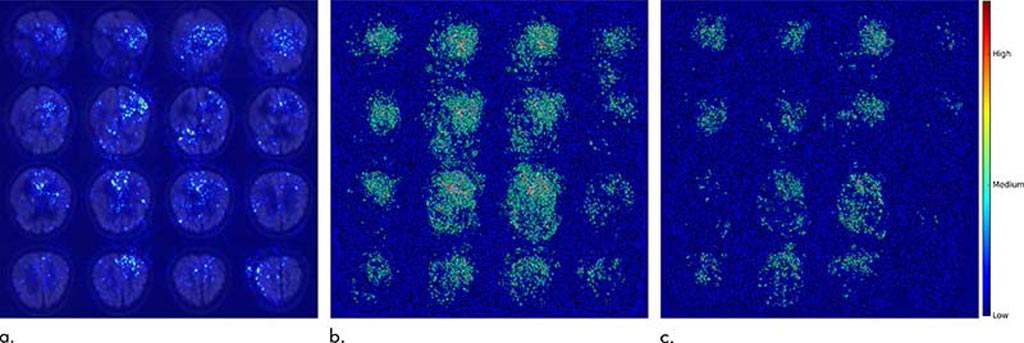AI Predicts Alzheimer’s Disease Years before Diagnosis
By MedImaging International staff writers
Posted on 23 Nov 2018
A new study on the application of deep learning (DL) to detect changes in brain metabolism predictive of Alzheimer’s disease (AD) has found that artificial intelligence (AI) improves the ability of brain imaging to predict AD.Posted on 23 Nov 2018
Timely diagnosis of AD is extremely important, although early diagnosis has proven to be challenging. Research has linked the disease process to changes in metabolism, as shown by glucose uptake in certain regions of the brain, although these changes can be difficult to recognize.

Image: Saliency map of deep learning model Inception V3 on the classification of Alzheimer disease. (a) A representative saliency map with anatomic overlay in 77-year-old man. (b) Average saliency map over 10 percent of Alzheimer’s Disease Neuroimaging Initiative set. (c) Average saliency map over independent test set. The closer a pixel color is to the \"High\" end of the color bar in the image, the more influence it has on the prediction of Alzheimer disease (Photo courtesy of UCSF).
The researchers trained the DL algorithm using an 18-F-fluorodeoxyglucose PET (FDG-PET) scan. They had access to data from the Alzheimer’s Disease Neuroimaging Initiative (ADNI), a major multi-site study focused on clinical trials to improve prevention and treatment of the disease. The ADNI dataset included more than 2,100 FDG-PET brain images from 1,002 patients. The researchers trained the DL algorithm on 90% of the dataset and then tested it on the remaining 10% of the dataset. Finally, the researchers tested the algorithm on an independent set of 40 imaging exams from 40 patients that it had never studied. The algorithm achieved 100% sensitivity at detecting the disease an average of more than six years prior to the final diagnosis.
According to the researchers, the algorithm could be a useful tool to complement the work of radiologists — especially in conjunction with other biochemical and imaging tests — in providing an opportunity for early therapeutic intervention. The researchers will now focus on training the DL algorithm to look for patterns associated with the accumulation of beta-amyloid and tau proteins, abnormal protein clumps and tangles in the brain that are markers specific to AD.
“If we diagnose Alzheimer’s disease when all the symptoms have manifested, the brain volume loss is so significant that it’s too late to intervene,” said study co-author Jae Ho Sohn, MD, from the Radiology & Biomedical Imaging Department at the University of California in San Francisco (UCSF). “If we can detect it earlier, that’s an opportunity for investigators to potentially find better ways to slow down or even halt the disease process.”
Related Links:
University of California in San Francisco














